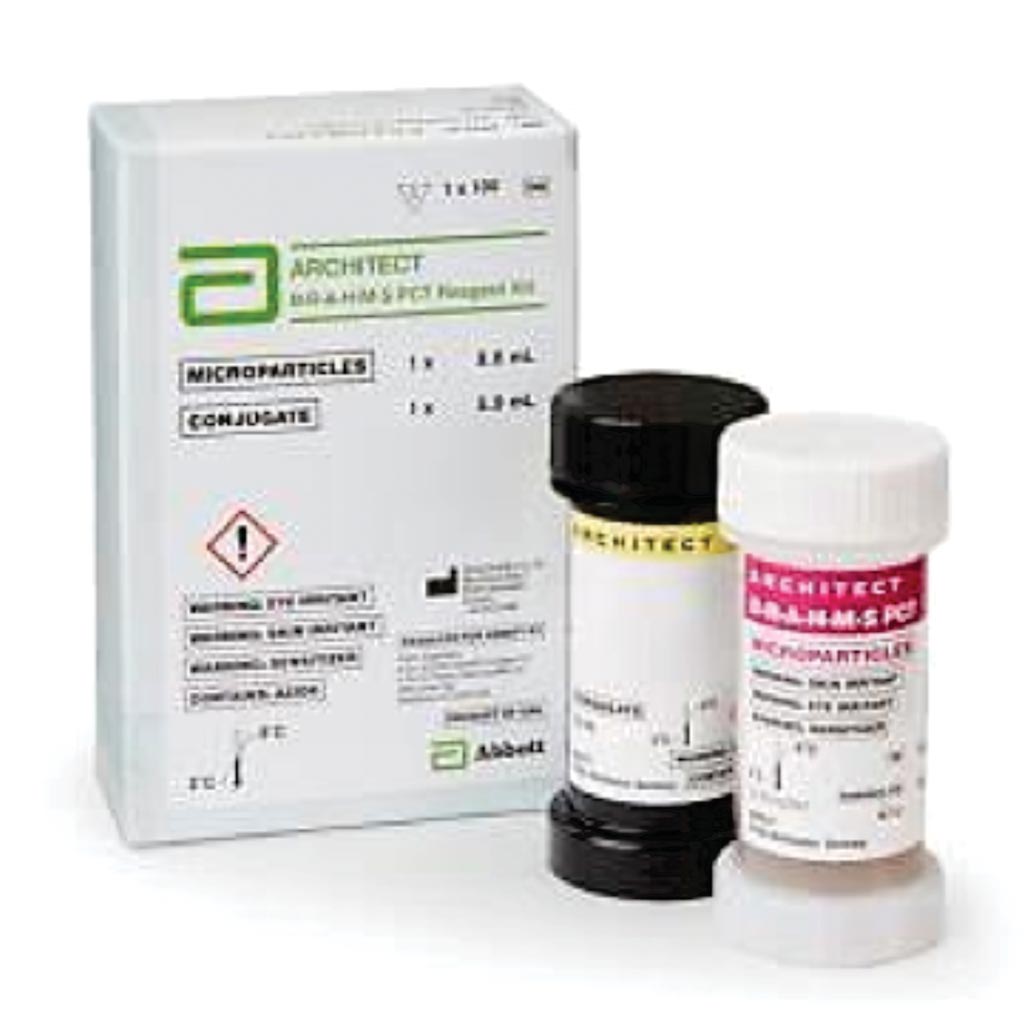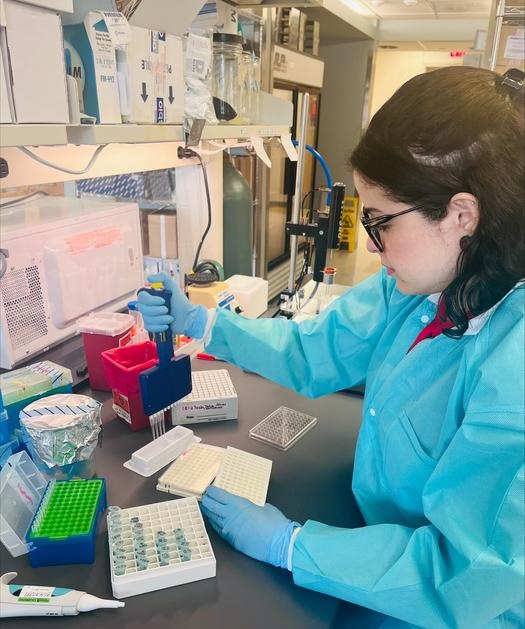Commercial Fully Automated Procalcitonin Immunoassay Compared
|
By LabMedica International staff writers Posted on 04 Dec 2018 |

Image: The ARCHITECT B.R.A.H.M.S PCT assay, which is a two-step immunoassay using chemiluminescent microparticle immunoassay (CMIA) technology (Photo courtesy of Abbott Laboratories).
Procalcitonin (PCT), a 13-kDa peptide precursor of calcitonin, has gained widespread acceptance as an early and specific biomarker for the presence of systemic bacterial infection. In particular, PCT monitoring has demonstrated value in guiding antibiotic use for bacterial infections.
Based on high plasma levels of PCT during systemic bacterial and fungal infections that decrease on recovery and low concentrations during infections of viral origin or nonspecific causes, the use of PCT assays can be used to assist the clinical management of different patient groups in a range of clinical settings.
An international team of scientists working with the Abbott Laboratories (Abbott Park, IL, USA) using de-identified 1,116 plasma or serum samples from patients tested at nine clinical laboratories in Australia, France, Germany, Italy, South Africa, Turkey, Vietnam and Wales. Plasma or serum samples were tested either fresh or following storage of the serum fraction at 2–8 °C for a maximum of 24 hours.
The team evaluated the ARCHITECT B.R.A.H.M.S PCT assay, which is a two-step immunoassay using chemiluminescent microparticle immunoassay (CMIA) technology, with a 29-minute assay completion time. The ARCHITECT B.R.A.H.M.S PCT assay was evaluated on Abbott Laboratories’ ARCHITECT i2000SR immunoanalyzers. The ARCHITECT B.R.A.H.M.S PCT assay was compared with the Roche Cobas (Basel, Switzerland), Diasorin LIAISON (Saluggia, Italy); bioMérieux VIDAS (Marcy-l'Étoile, France), and widely accepted B.R.A.H.M.S Kryptor systems (Hennigsdorf, Germany).
The scientists reported that using Deming regression analysis of the plasma or serum samples with PCT results detected across a dynamic assay range of 0.02–100 μg/L using the ARCHITECT B.R.A.H.M.S PCT assay yielded results of r = 0.989 versus. Roche Cobas, r = 0.986 versus Kryptor B.R.A.H.M.S, r = 0.987 versus BioMérieux VIDAS and r = 0.972 versus Diasorin LIAISON respectively. Concordance at cut-offs of 0.25 μg/L and 0.50 μg/L were 96.9% and 98.1% with Roche Cobas, 95.4% and 96.1% with B.R.A.H.M.S Kryptor, 93.8% and 98.4% with bioMérieux VIDAS, and 92.7% and 93.9% with Diasorin LIAISON.
The authors concluded that independent observations at nine different clinical laboratory sites confirmed the analytical characteristics of the ARCHITECT B.R.A.H.M.S PCT immunoassay. Compared with other assays, ARCHITECT B.R.A.H.M.S PCT offers excellent precision and low-end sensitivity. The study was published on November 9, 2018, in the journal Practical Laboratory Medicine.
Based on high plasma levels of PCT during systemic bacterial and fungal infections that decrease on recovery and low concentrations during infections of viral origin or nonspecific causes, the use of PCT assays can be used to assist the clinical management of different patient groups in a range of clinical settings.
An international team of scientists working with the Abbott Laboratories (Abbott Park, IL, USA) using de-identified 1,116 plasma or serum samples from patients tested at nine clinical laboratories in Australia, France, Germany, Italy, South Africa, Turkey, Vietnam and Wales. Plasma or serum samples were tested either fresh or following storage of the serum fraction at 2–8 °C for a maximum of 24 hours.
The team evaluated the ARCHITECT B.R.A.H.M.S PCT assay, which is a two-step immunoassay using chemiluminescent microparticle immunoassay (CMIA) technology, with a 29-minute assay completion time. The ARCHITECT B.R.A.H.M.S PCT assay was evaluated on Abbott Laboratories’ ARCHITECT i2000SR immunoanalyzers. The ARCHITECT B.R.A.H.M.S PCT assay was compared with the Roche Cobas (Basel, Switzerland), Diasorin LIAISON (Saluggia, Italy); bioMérieux VIDAS (Marcy-l'Étoile, France), and widely accepted B.R.A.H.M.S Kryptor systems (Hennigsdorf, Germany).
The scientists reported that using Deming regression analysis of the plasma or serum samples with PCT results detected across a dynamic assay range of 0.02–100 μg/L using the ARCHITECT B.R.A.H.M.S PCT assay yielded results of r = 0.989 versus. Roche Cobas, r = 0.986 versus Kryptor B.R.A.H.M.S, r = 0.987 versus BioMérieux VIDAS and r = 0.972 versus Diasorin LIAISON respectively. Concordance at cut-offs of 0.25 μg/L and 0.50 μg/L were 96.9% and 98.1% with Roche Cobas, 95.4% and 96.1% with B.R.A.H.M.S Kryptor, 93.8% and 98.4% with bioMérieux VIDAS, and 92.7% and 93.9% with Diasorin LIAISON.
The authors concluded that independent observations at nine different clinical laboratory sites confirmed the analytical characteristics of the ARCHITECT B.R.A.H.M.S PCT immunoassay. Compared with other assays, ARCHITECT B.R.A.H.M.S PCT offers excellent precision and low-end sensitivity. The study was published on November 9, 2018, in the journal Practical Laboratory Medicine.
Latest Clinical Chem. News
- 3D Printed Point-Of-Care Mass Spectrometer Outperforms State-Of-The-Art Models
- POC Biomedical Test Spins Water Droplet Using Sound Waves for Cancer Detection
- Highly Reliable Cell-Based Assay Enables Accurate Diagnosis of Endocrine Diseases
- New Blood Testing Method Detects Potent Opioids in Under Three Minutes
- Wireless Hepatitis B Test Kit Completes Screening and Data Collection in One Step
- Pain-Free, Low-Cost, Sensitive, Radiation-Free Device Detects Breast Cancer in Urine
- Spit Test Detects Breast Cancer in Five Seconds
- Electrochemical Sensors with Next-Generation Coating Advances Precision Diagnostics at POC
- First-Of-Its-Kind Handheld Device Accurately Detects Fentanyl in Urine within Seconds
- New Fluorescent Sensor Array Lights up Alzheimer’s-Related Proteins for Earlier Detection
- Automated Mass Spectrometry-Based Clinical Analyzer Could Transform Lab Testing
- Highly Sensitive pH Sensor to Aid Detection of Cancers and Vector-Borne Viruses
- Non-Invasive Sensor Monitors Changes in Saliva Compositions to Rapidly Diagnose Diabetes
- Breakthrough Immunoassays to Aid in Risk Assessment of Preeclampsia
- Urine Test for Monitoring Changes in Kidney Health Markers Can Predict New-Onset Heart Failure
- AACC Releases Comprehensive Diabetes Testing Guidelines
Channels
Molecular Diagnostics
view channelUltrasound-Aided Blood Testing Detects Cancer Biomarkers from Cells
Ultrasound imaging serves as a noninvasive method to locate and monitor cancerous tumors effectively. However, crucial details about the cancer, such as the specific types of cells and genetic mutations... Read more_1.jpg)
New DNA Origami Technique to Advance Disease Diagnosis
DNA origami is a method used to create nanostructures with exceptional precision, utilizing DNA strands as the foundational building blocks. These structures, however, are inherently fragile and prone... Read more.jpg)
New Respiratory Syndromic Testing Panel Provides Fast and Accurate Results
Respiratory tract infections are a major reason for emergency department visits and hospitalizations. According to the CDC, the U.S. sees up to 41 million influenza cases annually, resulting in several... Read more
New Synthetic Biomarker Technology Differentiates Between Prior Zika and Dengue Infections
Until now, researchers and clinicians have lacked diagnostic tools to easily differentiate between past infections with different flaviviruses—a family of mostly mosquito- and tick-borne viruses that include... Read moreHematology
view channel
Next Generation Instrument Screens for Hemoglobin Disorders in Newborns
Hemoglobinopathies, the most widespread inherited conditions globally, affect about 7% of the population as carriers, with 2.7% of newborns being born with these conditions. The spectrum of clinical manifestations... Read more
First 4-in-1 Nucleic Acid Test for Arbovirus Screening to Reduce Risk of Transfusion-Transmitted Infections
Arboviruses represent an emerging global health threat, exacerbated by climate change and increased international travel that is facilitating their spread across new regions. Chikungunya, dengue, West... Read more
POC Finger-Prick Blood Test Determines Risk of Neutropenic Sepsis in Patients Undergoing Chemotherapy
Neutropenia, a decrease in neutrophils (a type of white blood cell crucial for fighting infections), is a frequent side effect of certain cancer treatments. This condition elevates the risk of infections,... Read more
First Affordable and Rapid Test for Beta Thalassemia Demonstrates 99% Diagnostic Accuracy
Hemoglobin disorders rank as some of the most prevalent monogenic diseases globally. Among various hemoglobin disorders, beta thalassemia, a hereditary blood disorder, affects about 1.5% of the world's... Read moreImmunology
view channel
Diagnostic Blood Test for Cellular Rejection after Organ Transplant Could Replace Surgical Biopsies
Transplanted organs constantly face the risk of being rejected by the recipient's immune system which differentiates self from non-self using T cells and B cells. T cells are commonly associated with acute... Read more
AI Tool Precisely Matches Cancer Drugs to Patients Using Information from Each Tumor Cell
Current strategies for matching cancer patients with specific treatments often depend on bulk sequencing of tumor DNA and RNA, which provides an average profile from all cells within a tumor sample.... Read more
Genetic Testing Combined With Personalized Drug Screening On Tumor Samples to Revolutionize Cancer Treatment
Cancer treatment typically adheres to a standard of care—established, statistically validated regimens that are effective for the majority of patients. However, the disease’s inherent variability means... Read moreMicrobiology
view channel
Integrated Solution Ushers New Era of Automated Tuberculosis Testing
Tuberculosis (TB) is responsible for 1.3 million deaths every year, positioning it as one of the top killers globally due to a single infectious agent. In 2022, around 10.6 million people were diagnosed... Read more
Automated Sepsis Test System Enables Rapid Diagnosis for Patients with Severe Bloodstream Infections
Sepsis affects up to 50 million people globally each year, with bacteraemia, formerly known as blood poisoning, being a major cause. In the United States alone, approximately two million individuals are... Read moreEnhanced Rapid Syndromic Molecular Diagnostic Solution Detects Broad Range of Infectious Diseases
GenMark Diagnostics (Carlsbad, CA, USA), a member of the Roche Group (Basel, Switzerland), has rebranded its ePlex® system as the cobas eplex system. This rebranding under the globally renowned cobas name... Read more
Clinical Decision Support Software a Game-Changer in Antimicrobial Resistance Battle
Antimicrobial resistance (AMR) is a serious global public health concern that claims millions of lives every year. It primarily results from the inappropriate and excessive use of antibiotics, which reduces... Read morePathology
view channelHyperspectral Dark-Field Microscopy Enables Rapid and Accurate Identification of Cancerous Tissues
Breast cancer remains a major cause of cancer-related mortality among women. Breast-conserving surgery (BCS), also known as lumpectomy, is the removal of the cancerous lump and a small margin of surrounding tissue.... Read more
AI Advancements Enable Leap into 3D Pathology
Human tissue is complex, intricate, and naturally three-dimensional. However, the thin two-dimensional tissue slices commonly used by pathologists to diagnose diseases provide only a limited view of the... Read more
New Blood Test Device Modeled on Leeches to Help Diagnose Malaria
Many individuals have a fear of needles, making the experience of having blood drawn from their arm particularly distressing. An alternative method involves taking blood from the fingertip or earlobe,... Read more
Robotic Blood Drawing Device to Revolutionize Sample Collection for Diagnostic Testing
Blood drawing is performed billions of times each year worldwide, playing a critical role in diagnostic procedures. Despite its importance, clinical laboratories are dealing with significant staff shortages,... Read moreTechnology
view channel
New Diagnostic System Achieves PCR Testing Accuracy
While PCR tests are the gold standard of accuracy for virology testing, they come with limitations such as complexity, the need for skilled lab operators, and longer result times. They also require complex... Read more
DNA Biosensor Enables Early Diagnosis of Cervical Cancer
Molybdenum disulfide (MoS2), recognized for its potential to form two-dimensional nanosheets like graphene, is a material that's increasingly catching the eye of the scientific community.... Read more
Self-Heating Microfluidic Devices Can Detect Diseases in Tiny Blood or Fluid Samples
Microfluidics, which are miniature devices that control the flow of liquids and facilitate chemical reactions, play a key role in disease detection from small samples of blood or other fluids.... Read more
Breakthrough in Diagnostic Technology Could Make On-The-Spot Testing Widely Accessible
Home testing gained significant importance during the COVID-19 pandemic, yet the availability of rapid tests is limited, and most of them can only drive one liquid across the strip, leading to continued... Read moreIndustry
view channel
Danaher and Johns Hopkins University Collaborate to Improve Neurological Diagnosis
Unlike severe traumatic brain injury (TBI), mild TBI often does not show clear correlations with abnormalities detected through head computed tomography (CT) scans. Consequently, there is a pressing need... Read more
Beckman Coulter and MeMed Expand Host Immune Response Diagnostics Partnership
Beckman Coulter Diagnostics (Brea, CA, USA) and MeMed BV (Haifa, Israel) have expanded their host immune response diagnostics partnership. Beckman Coulter is now an authorized distributor of the MeMed... Read more_1.jpg)












